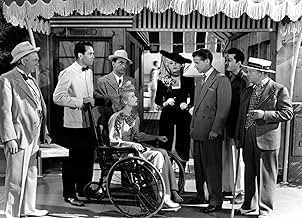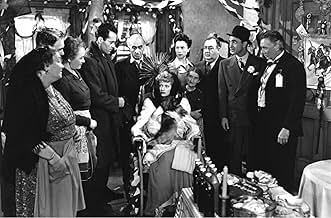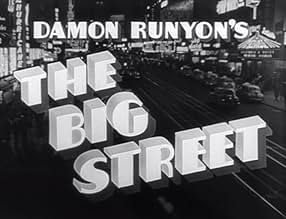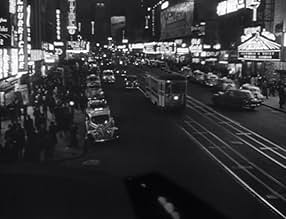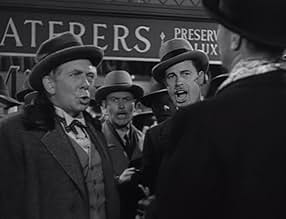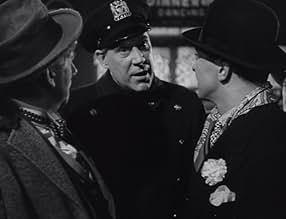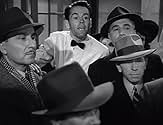IMDb RATING
6.4/10
1.8K
YOUR RATING
A busboy in unrequited love with a nightclub performer grows closer to her after she is paralyzed in an attack by her gangster boyfriend.A busboy in unrequited love with a nightclub performer grows closer to her after she is paralyzed in an attack by her gangster boyfriend.A busboy in unrequited love with a nightclub performer grows closer to her after she is paralyzed in an attack by her gangster boyfriend.
- Awards
- 2 wins total
William T. Orr
- Decatur Reed
- (as William Orr)
Don Barclay
- Eating Contest Emcee
- (uncredited)
Mary Bayless
- Nightclub Patron
- (uncredited)
Louise Beavers
- Ruby - Gloria's Maid
- (uncredited)
Anthony Blair
- O'Rourke
- (uncredited)
- Director
- Writers
- All cast & crew
- Production, box office & more at IMDbPro
Featured reviews
I saw this film in the late '60's on our local TV station. It was not unusual to catch B movies starring our television personalities back in the day. What a film! I cried at the end. What shines through is the portrayal of the class levels within American society then. Lucille Ball's dame certainly internalized the idea that she was above the class of Henry Fonda's Pinky even while she subsisted on the food he brought home for her after she was no longer a gangster's moll. Henry Fonda's Pinky was a true codependent, picking her up from the floor, keeping her alive, even moving her from cold, icy New York City to the east coast Eden of Miami (shades of Midnight Cowboy!)with nary a thank you from this ungrateful woman. Through a plot device, Pinky and the busboys don tuxedos at the end so she condescends to be carried up the stairs by one of their own, enabling her self deceit that she is an upper class lady. Someone wrote it was too much of a downer to have been successful when released and couldn't be made today as the bit players do not exist to round out the cast. Rise above the limitations of both eras and enjoy this film.
"The Big Street" was not a major hit when first released but the critics at the time all noted Lucille Ball's superb star-making performance as one of the all-time nastiest women ever to reach the big screen. Lucy was already a minor star thanks to a string of popular B-grade comedies and dramas but this film cemented her stardom and brought her to MGM where she reached an early peak the next year. The film is sentimental and does have some plot points that have to be swallowed but Ball's great acting and chemistry with a splendid Fonda makes this tale of unrequited love work. Fonda plays a kind innocent busboy who falls madly in-love with a crippled chanteuse(Ball). The last scene on the dance floor is unforgettable. Why RKO did not get Lucy an Oscar nomination for this performance is a crime. All the critics at the time hailed her work in this but it just slipped under the rug when the film posted only small profits. This was the kind of role Bette Davis made her own but Ball does it without Davis' habit of falling into mannerisms. Agnes Moorehead is also excellent as Fonda's concerned friend. Beautiful cinematography makes Ball look incredible in her close-ups. Worth a look but overlook the occasional mawkish elements. Lucy makes it a must.
Years before Damon Runyon got Broadway and screen immortality with Guys and Dolls, one of his short stories was adapted for the silver screen concerning the unrequited love of a bus boy for a Broadway entertainer. That story was The Big Street and the title is named for the street that Runyon chronicled, Broadway.
Though The Big Street got good reviews for its stars Henry Fonda and Lucille Ball, the subject matter was way too much of a downer for mass audience appeal. The plot as it is tells the story of Little Pinks who is madly in love with this nightclub entertainer who being the mistress of gangster Barton MacLane, can't see him for beans and wouldn't look up from the table to try.
That all changes when MacLane slaps her so hard she falls down a flight of stairs and becomes paralyzed. All abandon her then and in truth she didn't exactly near and endear herself to too many. That is except for Fonda and the Broadway characters he lines up to give her a helping hand.
A movie like The Big Street could not be made today because we don't have the rich assortment of character players to entertain us. The people Damon Runyon created were made for such performers as Sam Levene, Ray Collins, Millard Mitchell, etc. And of course the two best performers who steal the film from the leads when they're on are Agnes Moorehead and Eugene Palette. Moorehead didn't do too much comedy and her gift for it would not be tapped again until she was Endora in Bewitched.
Lady for a Day and Guys and Dolls enjoyed much greater success because they were done in a comic vein. My guess is that is what people expect when they see Damon Runyon on a theater program credit.
Still The Big Street is nicely-nicely done as Eugene Palette and Stubby Kaye would say.
Though The Big Street got good reviews for its stars Henry Fonda and Lucille Ball, the subject matter was way too much of a downer for mass audience appeal. The plot as it is tells the story of Little Pinks who is madly in love with this nightclub entertainer who being the mistress of gangster Barton MacLane, can't see him for beans and wouldn't look up from the table to try.
That all changes when MacLane slaps her so hard she falls down a flight of stairs and becomes paralyzed. All abandon her then and in truth she didn't exactly near and endear herself to too many. That is except for Fonda and the Broadway characters he lines up to give her a helping hand.
A movie like The Big Street could not be made today because we don't have the rich assortment of character players to entertain us. The people Damon Runyon created were made for such performers as Sam Levene, Ray Collins, Millard Mitchell, etc. And of course the two best performers who steal the film from the leads when they're on are Agnes Moorehead and Eugene Palette. Moorehead didn't do too much comedy and her gift for it would not be tapped again until she was Endora in Bewitched.
Lady for a Day and Guys and Dolls enjoyed much greater success because they were done in a comic vein. My guess is that is what people expect when they see Damon Runyon on a theater program credit.
Still The Big Street is nicely-nicely done as Eugene Palette and Stubby Kaye would say.
The Big Street (1942)
Packed with great actors, major and minor, in a fast fast whirlwind
First of all, Agnes Moorehead and Ray Collins played the previous year in another raging movie of some fame (Citizen Kane, yup), and here they are loaded up against a dozen other great character actors, plus a couple big names. Headlining is the well known Henry Fonda, still young, but fresh off of a couple great films, Grapes of Wrath (1940), and The Young Mr. Lincoln (1939). But in a kind of startling role for those who know Lucille Ball as a brilliant and goofy t.v. comedian a decade later, we have her here as a big-eyed femme fatale, or would-be femme fatale until fate takes a turn.
You might think this one is a screwball comedy the way it starts, but keep watching-- there is violence and trauma soon enough, and the movie takes a turn that Fonda is worthy of. There is a Frank Capra feel-good element amidst the hardship, but it is full of verve, and all these odd characters who really are (were and are) what New York is at its best. The director Irving Reis (with photographer Russell Metty) keeps the scenes snappy, and sometimes moves from a closeup of a face to a background quickly, to let a character make a dramatic point. There are lots of movie tricks, quick fades from scene to scene to show the passing of time, and some tacky back projection, and it really goes along with the fairy tale narrative.
And there really is an unbelievable ending, which you have to take with the whole flavor of the movie, a kind of sincerity/fantasy mixture.
Packed with great actors, major and minor, in a fast fast whirlwind
First of all, Agnes Moorehead and Ray Collins played the previous year in another raging movie of some fame (Citizen Kane, yup), and here they are loaded up against a dozen other great character actors, plus a couple big names. Headlining is the well known Henry Fonda, still young, but fresh off of a couple great films, Grapes of Wrath (1940), and The Young Mr. Lincoln (1939). But in a kind of startling role for those who know Lucille Ball as a brilliant and goofy t.v. comedian a decade later, we have her here as a big-eyed femme fatale, or would-be femme fatale until fate takes a turn.
You might think this one is a screwball comedy the way it starts, but keep watching-- there is violence and trauma soon enough, and the movie takes a turn that Fonda is worthy of. There is a Frank Capra feel-good element amidst the hardship, but it is full of verve, and all these odd characters who really are (were and are) what New York is at its best. The director Irving Reis (with photographer Russell Metty) keeps the scenes snappy, and sometimes moves from a closeup of a face to a background quickly, to let a character make a dramatic point. There are lots of movie tricks, quick fades from scene to scene to show the passing of time, and some tacky back projection, and it really goes along with the fairy tale narrative.
And there really is an unbelievable ending, which you have to take with the whole flavor of the movie, a kind of sincerity/fantasy mixture.
For fans of Lucy, Ball's role here takes real getting used to. "Her Highness" character is shrewish and generally not very likable. Ball does, however, get to show some very real chops outside her usual comedic range. As a result, I've got a new appreciation of her as an actress as well as a comedienne.
The movie itself is undermined by a weak central focus. Neither Ball's Her Highness nor Fonda's servile bus boy is easy to identify with. Thus, it's hard to sympathize with the overbearing HH even after she's crippled. Nor is Little Pink's (Fonda) utterly selfless devotion understandable given the imperious way she treats him. As a result, the movie's core flounders. A charitable view might take the movie as a fairy tale where the unlikely bus boy, a prince in his sudden formal wear, rescues the crippled princess if only for a moment.
Of course, being a Damon Runyon creation, there's the usual number of street-smart Broadway mugs. So the margins shine with such colorful types as Palette, Levene, Collins, et al. Also, catch dragon lady Agnes Moorehead in a rare sympathetic role (Shumberg); plus premier eccentric Hans Conreid as the grumpy headwaiter. And for folks interested in 50's TV, there's Wm. T. Orr as handsome socialite Decatur Reed. This is the same Orr who produced many of the popular hour-long TV shows of the late 50's, such as Maverick, 77 Sunset Strip, Lawman, et al. I've seen his name for years, never thinking he might show up on screen.
All in all, the only reason to catch this 80-minute pastiche is for Lucy's surprising performance and the colorful peripheral characters. Otherwise, it's pretty forgettable, especially for fans of Fonda.
The movie itself is undermined by a weak central focus. Neither Ball's Her Highness nor Fonda's servile bus boy is easy to identify with. Thus, it's hard to sympathize with the overbearing HH even after she's crippled. Nor is Little Pink's (Fonda) utterly selfless devotion understandable given the imperious way she treats him. As a result, the movie's core flounders. A charitable view might take the movie as a fairy tale where the unlikely bus boy, a prince in his sudden formal wear, rescues the crippled princess if only for a moment.
Of course, being a Damon Runyon creation, there's the usual number of street-smart Broadway mugs. So the margins shine with such colorful types as Palette, Levene, Collins, et al. Also, catch dragon lady Agnes Moorehead in a rare sympathetic role (Shumberg); plus premier eccentric Hans Conreid as the grumpy headwaiter. And for folks interested in 50's TV, there's Wm. T. Orr as handsome socialite Decatur Reed. This is the same Orr who produced many of the popular hour-long TV shows of the late 50's, such as Maverick, 77 Sunset Strip, Lawman, et al. I've seen his name for years, never thinking he might show up on screen.
All in all, the only reason to catch this 80-minute pastiche is for Lucy's surprising performance and the colorful peripheral characters. Otherwise, it's pretty forgettable, especially for fans of Fonda.
Did you know
- TriviaLucille Ball's favorite of her films. She felt her performance was unjustly ignored by the Academy of Motion Picture Arts and Sciences (AMPAS).
- GoofsA gathering to raise money to send Gloria Lyons to Florida doesn't raise enough, so a suggestion is made to put it on a horse. A face-on shot of Horsethief shows him sitting down and pulling a paper from his inside pocket. He stands up and unfolds the paper, but then a long shot shows him just starting to take the paper from his pocket.
- Quotes
Gloria Lyons: Love is something that gets you one room, two chins and 3 kids.
- Crazy creditsOpening credits: "Loser's Lane --- the sidewalk in front of Mindy's Restaurant on Broadway-- is not as high-toned a trading center as Wall Street, but the brokers are a lot more colorful. Generally they prefer to put their money on a prizefight or horserace, but when the action slows, anything can happen and it usually does. Tonight, for example, the citizens of the Lane are discussing the latest contest in their usual quiet way --"
- ConnectionsFeatured in AFI Life Achievement Award: A Tribute to Henry Fonda (1978)
- SoundtracksWho Knows?
(1942)
Lyrics by Mort Greene
Music by Harry Revel
Performed by Lucille Ball at the New York nightclub (uncredited)
Reprised by her with Ozzie Nelson and Orchestra at the Florida nightclub (Vocals for Miss Ball by Martha Mears) (uncredited)
Played often in the score
- How long is The Big Street?Powered by Alexa
Details
- Release date
- Country of origin
- Language
- Also known as
- The Big Street
- Filming locations
- Miami, Florida, USA(second unit - exteriors)
- Production company
- See more company credits at IMDbPro
- Runtime1 hour 28 minutes
- Color
- Aspect ratio
- 1.37 : 1
Contribute to this page
Suggest an edit or add missing content


